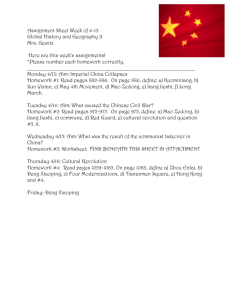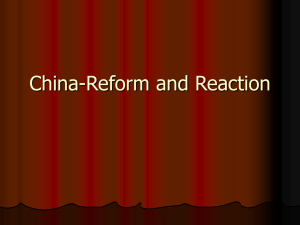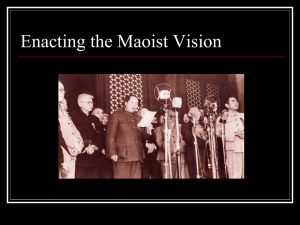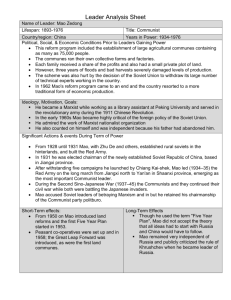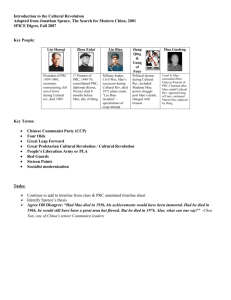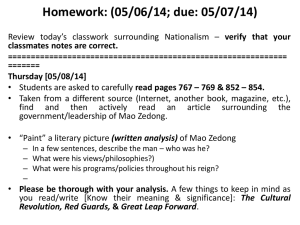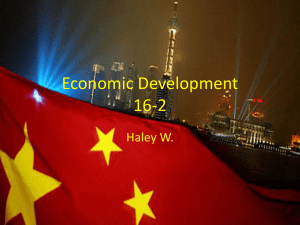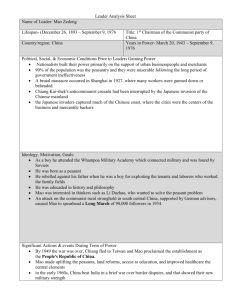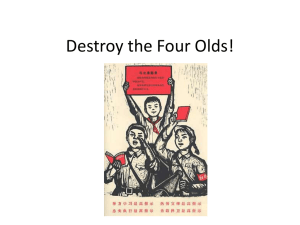GREAT LEAP FORWARD HI 168: Lecture 13 Dr. Howard Chiang
advertisement
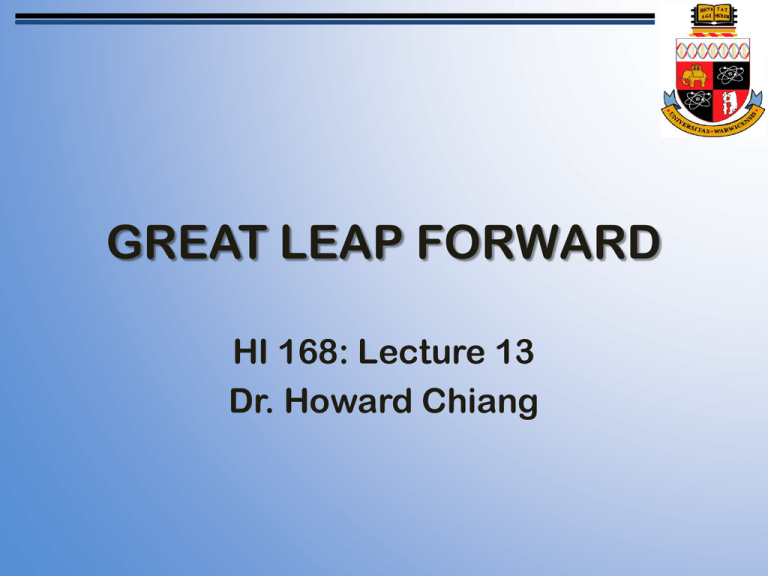
GREAT LEAP FORWARD HI 168: Lecture 13 Dr. Howard Chiang Mao and Khrushchev, 1958 OVERVIEW - Marriage Reform - Intellectuals - Hundred Flowers and Anti-Rightist Campaign - The Great Leap Forward - People’s Communes - Backlash against GLF - Great Famine - Lin Biao and Mao Zedong, Liu Shaoqi and Deng Xiaoping MARRIAGE REFORM - Marriage Law of the People’s Republic of China on April 13, 1950 - Free choice of partners, monogamy, equal rights for men and women, and ‘the protection of lawful interests of women and children’ - Gave cadres the authority to act on some of the worst cases of abuse - A serious challenge to the authority of the immediate and extended family INTELLECTUALS - distrust of ‘intellectuals’ (zhishi fenzi, 知 識分子, ‘knowledgeable elements’) - Feng Xuefeng (馮雪峰), Hu Shi (胡適), and Hu Feng (胡風) – 5 daggers: study Marxism, live among the workers and peasants, counter bourgeois ideology, conserve national traditions, serve politics enthusiastically - Campaign against hidden counterrevolutionaries HUNDRED FLOWERS - Zhou Enlai, Premier of PRC 1949-76: ‘Report on the Question of Intellectuals’ - ‘sci & tech in socialist construction’ - ‘let a hundred flowers bloom and a hundred schools of thought contend’ - Mao’s support – speech on May 2, 1956 - Feb. 1957, Mao spoke again – “On the Correct Handling of Contradictions among the People” ANTI-RIGHTIST CAMPAIGN - Students, journalists, historians, social scientists, and other academic researhcers – dissent and discontent - Anti-Rightist Campaign – a revised version of Mao’s ‘Contradictions’ - 4-700,000 ‘rightists’ – subjected to public vilification, sent to farms where contacts with peasants ‘cured’ them - Deng Xiaoping, secretary-general - 12,000 members of democratic parties GREAT LEAP FORWARD - 3 Red Banners: General Line for Building Socialism, Great Leap Forward, and People’s Communes - May 5-23, 1958 Second Plenary session of Eight Party Congress - Lin Biao, Hongqi (Red Flag), Mao’s ‘Introducing a Cooperative’ (1958) - Jun 22, Report on the Steel Output Plan: 1959 – 30 million tons 1962 – 50-90 million tons https://www.youtube.com/watch?v=60_Q-kAZbXA PEOPLE’S COMMUNES - Aug 1958 Mao: Hebei, Henan, Shandong - Small and rural communes (township) vs. urban communes - Qiliying (Seven League Camp) commune: 53,200 population; 1, 394, 303 hectares of land; 56 advanced cooperatives; 38 production brigades; 298 production teams - Communes replaced existing local government at the township level BACKLASH AGAINST GLF - Nov. 28-Dec. 10, 1958: 6th Plenary Session of the 8th Central Committee: ‘Resolution on Some Problems Concerning the People’s Communes’ - Decentralization of power in the communes and the restoration of ownership and management to the production team - Mao replaced by Liu Shaoqi as chairman of PRC LUSHAN CONFERENCE - Peng Dehuai replaced by Marshal Lin Biao - Peng’s attack on Mao - Mao linked Peng with ‘revisionist’ - The 8th Plenum of the Eighth Central Committee published on Aug 26 – some success at reducing economic targets, but ‘right opportunists’ lost their posts Peng Dehuai GREAT FAMINE - Policy errors and the transfer of labor from the land to impressive construction projects of dubious practical value led to a serious shortfall in the supply of foodstuffs - Bad weather and the withdrawal of the Soviet technicians alone could not account for more than 20 million excess deaths that were recorded between 1959 and 1961 LIN-MAO & LIU-DENG - Lin Biao & Mao Zedong: - Selected Works by Sep. 30, 1960 - Quotations from Chairman Mao – the ‘little red book’ - Socialist Education Movement (196265) & PLA as model for everyone - Liu Shaoqi & Deng Xiaoping - drafted a series of weighty documents with the most uninspiring titles – dull but very practical Lin Biao Deng Xiaoping Liu Shaoqi
